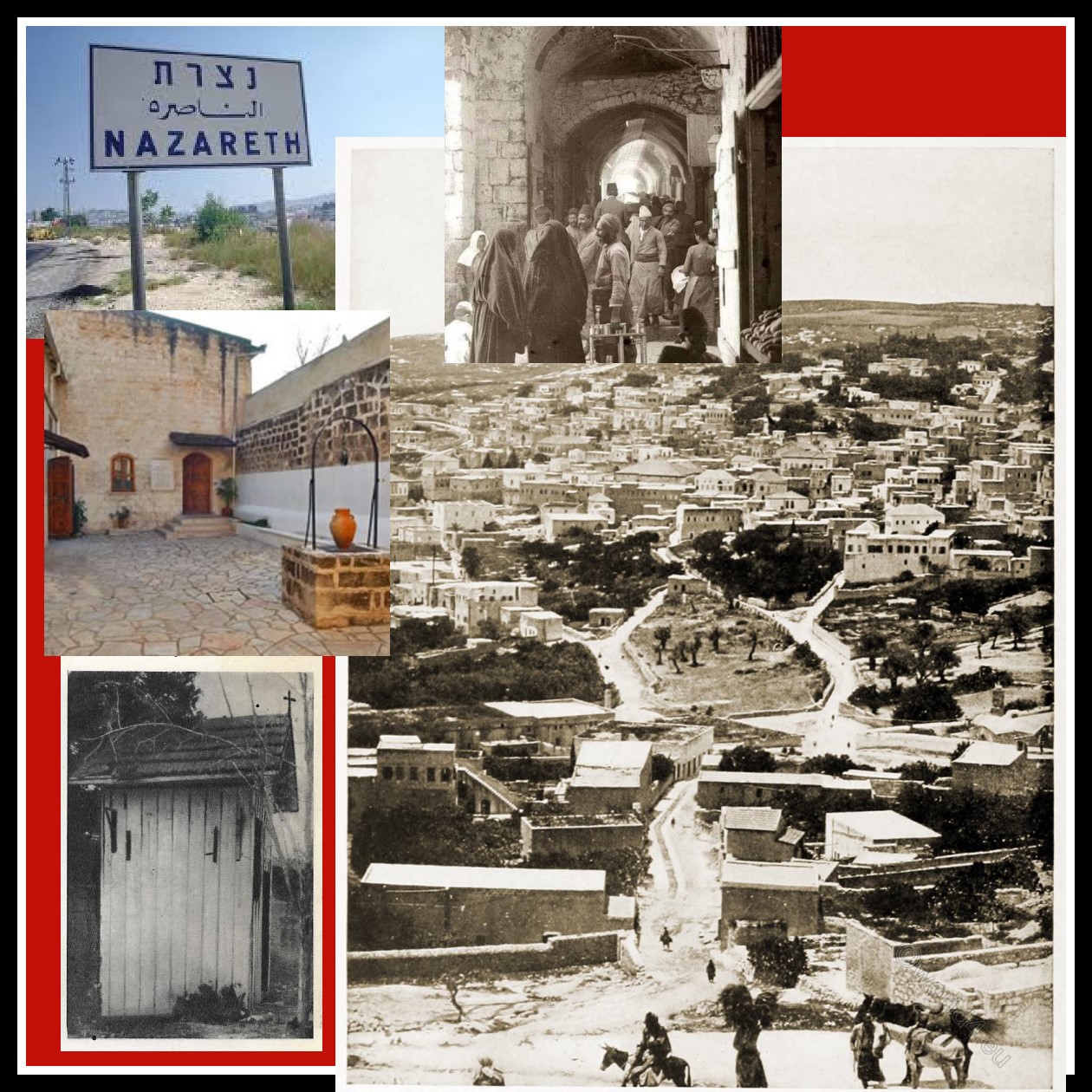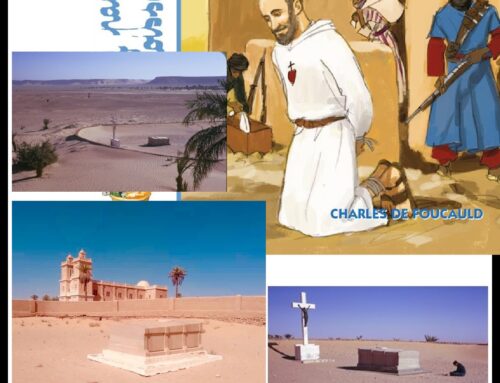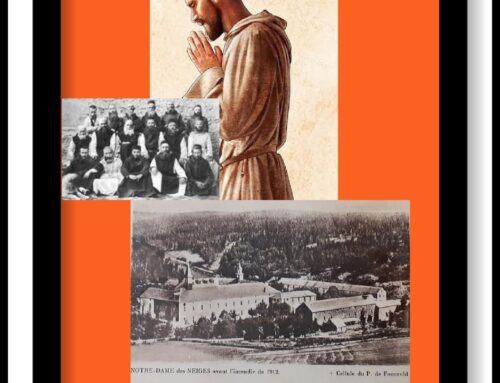In this period, when personal notes abounded, correspondence was very scarce: Charles wanted silence and darkness. I do not give an address to the rare correspondents, but I hope that the letter will be written firmly, first of all aristocratic surname or even the surname itself, when, from the beginning of 1899, he began to call himself “Brother Charles of Jesus.” In addition to his cousin Marie de Bondy, his sister Marie de Blic, and spiritual director Fr. Huvelin, his correspondents include: the Abbot General of Trappa (Dom Sebastien Wyart), the Abbot of Staueli (formerly of Akbès) Dom Louis de Gonzague, and Fr. Jérôme. Precisely because the latter particularly seeks your heart, addressing you like a spiritual thread, the papers reflect the style and content of your meditations.
To Father Jérôme – Nazareth, May 31, 1897
May JESUS always be with you, dear Father [1]!
Dear father, I love you, I pray for you. I don’t want to go on too long: we are so united when we embrace each other at the foot of the Tabernacle! That’s where we need to be. We are one in JESUS. Let us keep him more and more company in the Blessed Sacrament. We breathe out there, before Him, like the little lamp. And we ask only one thing, that He live in us, that He make us think His thoughts, speak His words, and do His actions. Let’s stop being and let Him live in us.
I want to tell you one thing: if you ever have a pain, a difficulty, remember that you have a brother in me, the most loving, the most tender, the most devoted, and write to me at length through Don Huvelin, 6, rue Laborde, Paris. I will answer you, I will pity you, I will pray for you. If you do not receive answers, it is because your brother will no longer be in this world: then pray for the repose of his soul.
From the bottom of my heart, I pray to the Lord to give you the grace to love Him with all my heart, with all my soul, with all my spirit, and with all my strength. May he perfectly glorify our Beloved JESUS Amen. –Fr. Maria Alberic [2]
To Father Jérôme – Nazareth, September 30, 1897, Feast of St. Jerome
Have a good party! For your celebration I am sending you a poem that I read some time ago, that I thought was beautiful and that I think will be good for you. It expresses a part of the feelings you should want to have. In part, because if our soul is to be filled with grief as great as the sea when we think of the sufferings of Jesus and the sins of men, it must also overflow with the joy of the infinite blessedness of God and the glory of the inhabitants of heaven. Abyss of joy and abyss of pain, such has always been the soul of the Master, such must be ours, and the more we love, the more intense the joy and pain will be. They will grow together, because they start from the same source: they are two rivers of living water that flow from the bosom of those who believe in Jesus. together and One with Him, and “consummated in unity” [3]
… Let us try, then, to become one with Jesus, to reproduce his life in ours, to shout his doctrine from the rooftops with our thoughts, our words and our actions, to make him reign in us, to live in us! If he gives us joys, let us accept them with gratitude, the Good Shepherd gives us these sweet herbs to strengthen us and allow us to follow him later on arid paths. If he gives us crosses, let us kiss them, “Bona Quid” is the grace of graces, it is walking more than ever hand in hand with Jesus, it is relieving him by carrying his cross like Simon of Cyrene, he is our Beloved. Whoever invites us to declare to Him already show him our love. Pains of the soul, sufferings of the body, “let us rejoice and be glad” [4], Jesus calls us, tells us to tell him that we love him, and to repeat it to him as long as our suffering lasts. All crosses, great or small, including all setbacks, are a call from the beloved. He asks us for a declaration of love, and a declaration that lasts as long as the cross. Oh! How I would think this, one would like the cross to last forever! It will last as long as Jesus wants, no matter how sweet it is, no matter how much we love it, we only want it when Jesus wants it for us. Your will, brother, and not ours. We don’t want to think of ourselves any more than if we didn’t exist: we’ll think only of You, our Beloved Spouse! We don’t want our good, we want yours. We ask nothing for ourselves, we ask for your glory: thy name be sanctified, thy kingdom come, thy will be done in all thy children, men; let it be done to us; May we glorify you as much as possible throughout our lives, do your will, comfort your heart as much as possible. That’s all we need, that’s all we want. Here we are at your feet, do with us what you will, or this or that, as you will, we have no will, you desire nothing but the fulfillment of your will, your good, your glory and the consolation of your divine Heart.
May we, my dearly beloved brother, be consummated in Oneness, be in His love, be together and in Him, in time andin eternity. This Beloved Spouse of our souls strengthens every day the bonds that bind us forever to Him, and gives us the grace to console His Sacred Heart to the fullest in every moment of our lives.
His brother who loves him in Jesus.- Fr. Maria Alberic [5] .
[After an initial temptation to return toFrance and beg there for the Poor Clares whom he sees as too poor, Charles confesses to Don Huvelin that, as the anniversary of his first vows approaches, he suffers another temptation: that of returning to the Trappist of Akbès, where he would have been made superior in two years… It was a temptation that lasted several months and led him to think about the priesthood as well. Father Huvelin invited him several times to stay and consolidate, until he had an indication [6] …] ]
To Father Jérôme – Nazareth, January 28, 1898, Saint Cyril of Alexandria
My dear father, my good brother in Jesus, we are still at Christmas; in body I am in Nazareth (from which I have not left since my last letter), but in spirit I have been in Bethlehem for more than a month; That is why I am writing to you at the manger, between Mary and Joseph. It feels so good! It’s cold and snowy outside, the image of the world. But in the grotto, illuminated by Jesus, how comfortable it is! How sweet, warm, bright! Our dear Father Abbate wants to know what the sweet baby Jesus has been murmuring for a month now when I look at him, when I watch at his feet at night among his holy parents, when he comes to my arms, to my heart and to my heart with his Holy Communion. Repeat: “The will of God; God’s will.” “Behold, I come: it is written of me at the head of the book of my destinies that I will do Thy Will
To Father Jérôme – Nazareth, February 15, 1898
, in such an impossibility of praying, that I asked my director if it was necessary to continue without writing, or to resume the written meditations: he replied: “Write down your meditations: it is a very good way of meditating: and it is particularly useful for you, because it serves to fix thoughts.” So I write every night. You will find a slight difference between these meditations and the others: many times they are prayers, family conversations with the divine spouse of our souls, I tell him everything I have to say to him, it is very intimate, but I do not want to have any secret from you, dear brother in Jesus. You’ll see the foundation of my soul in heaven, so why not start now? I only ask you to keep these notebooks, so that in case you need them later, I can ask you: I don’t think I do, but I prefer that we take this care, because several times I have destroyed a series of meditations of this kind, and since then I have repented, seeing that they would have been useful to me. I’m telling you this so you can take advantage of my experience. Take notes of all kinds: then, when you least expect it, this or that series of notes is very useful: have everything in order, and do not destroy: that is what I am doing right now. When I left Rome I didn’t want to write anything. But I found myself in such a dryness,[15] in such an impossibility of praying, that he asked my director whether it is necessary to continue not writing, or to resume written meditations: he answered: “Write down your meditations: it is a very good way of meditating: and it is particularly useful to you, because it serves to fix thoughts.” So I write every night. You will find a slight difference between these meditations and the others: on the menu there are prayers, family conversations with the divine spouse of our souls, I tell you everything I want to tell you, it is very intimate, but for you I don’t want to keep secrets, sweet herman in Jesus. It will be the foundation of my soul in heaven, so why not enter now? I only want you to keep an eye on these notebooks, so that in case the need arises, you can order them: I don’t think I have any, but I’d rather we take care of this, because it varies many times destroyed series of meditations of this kind, and for that I regretted it, as if they were useful to me. I’m telling you this so you can try my experience. Take notes of everything like: later, at the moment you least expect it, this or that series of notes is very useful: keep everything in order and don’t destroy: that’s what I have now.
Indifference also to stay in Staueli or go where God wills. … But I can add one thing, is that I am excited to see that it is definitely established that they will not do this military service that is so inappropriate for the disciples of Jesus; and another thing is that if you cannot stay in Staueli, I should be very glad to see you with the Capuchins who are the flower of the Franciscan order, fervent, poor, austere, men of prayer. And I would also be glad to see you in Lebanon, the biblical land of which the Canticle speaks in every line.
… Do something that I do, on the feasts of the Blessed Virgin,[16] I always take a homily from some Father of the Church, in French or in Latin, in, I always take a homily from some Father of the Church, in French or in Latin, on this feast or on another, but a homily on the Blessed Virgin, and going to church I read it there, as close as possible to the Blessed Sacrament, I read several pages or just two lines, more or less: when the good Lord invites me to pass from reading to prayer, I follow this movement. If the prayer languishes, I pick up the book again; if it does not come to me, I remain; if she descends upon me, and if the Blessed Virgin has me in this state of sweet prayers at her feet, I leave the book and do not take it up again. I recommend to you this means of celebrating our Mother, by having us led to her by one of these great men who call themselves Doctors of the Church, and by going to seek her with his Son, in the Blessed Sacrament. …
Up. Jérôme – Nazareth, May 19, 1898, Monday after the Ascension
Thank you, my dear Father, for your good letter of April 15; thank you for the precious memories of Subiaco. Yes, these are the great examples that St. Benedict gives us, “leave things in vain to the vain, shut the door and call on Jesus”, this is what you must do at this moment, young minor of the Blessed Virgin, aspirant when the major orders please God, desiring them, because they will unite her more and more to God and make her capable of glorifying him more and more, desiring them to come when God wills, “his will and not ours,” but if he somehow leaves it to his choice, preferring it to be late rather than early, in order to prolong the time of preparation and receive them more worthily [18].and to remain there to receive God’s grace: it is there that we empty ourselves, that we expel from ourselves everything that is not God, and this little house of our soul is completely emptied to leave the whole place to God alone. The Jews passed through the desert, Moses lived there before receiving his mission, St. Paul leaving Damascus was going to spend three years in Arabia, his patron Saint Jerome, St. John Chrysostom also prepared in the desert. It’s essential. It’s a time of grace. It is a period from which all souls who wish to bear fruit must necessarily pass; they need this silence, this recollection, this forgetfulness of the whole creation in the midst of which God establishes his kingdom in it, and forms in it the interior spirit, the intimate life with God, the conversation of the soul with God in faith, hope and charity. Later on, the soul will bear fruit exactly to the extent that the inner man is formed in it. If this interior life is nothing, even with all its zeal, its good intentions, much work, the fruits will be nothing: it is a source that would like to give holiness to others but cannot not have it. One gives only what one has: and it is in solitude, in this life alone with God alone, in this profound recollection of the soul that forgets the whole of creation in order to live alone in union with God, that God gives himself entirely to the one who gives in this way. yes himself entirely in Him. Give yourself entirely to Him alone, my dearly beloved Father, during these years of preparation, of thanksgiving, and He will give Himself entirely to you. In this, do not be afraid to be unfaithful to your duties towards creatures, it is the only means you have to serve them effectively: look at St. Paul, St. Benedict, St. Patrick, St. Gregory the Great, so many others. Climb higher: look to St. John the Baptist, look to Our Lord. Our Lord didn’t need it, but He wanted to give us an example. Give back to God what is God’s, believe well that at this time at least until your priesthood, probably, as long as holy obedience allows you to do so. Our Lord didn’t need it, but He wanted to give us an example. Give back to God what is God’s, believe well that at this time at least until your priesthood, probably, as long as holy obedience allows you to do so. Our Lord didn’t need it, but He wanted to give us an example. Give back to God what is God’s, believe well that at this time at least until your priesthood, probably, as long as holy obedience allows you to do so.
The grace of Our Lord Jesus be with you. Her unworthy brother who loves her in the Sacred Heart of Jesus.- Fr. Maria Alberic [22] .
[During a first stay in July 1898 at the Poor Clares of Jerusalem, the abbess encouraged him to find a companion… Despite Fr. Huvelin’s perplexity, Charles went in search of a former novice from Akbès, an Oriental, who had returned to his family. But the young man did not want to follow him, and on October 4 Charles was back in Jerusalem.
On October 15, 1898, the feast of St. Teresa of Avila, Carlos, who was still with the Poor Clares of Jerusalem, wrote to Don Huvelin to tell him about his meeting with the abbess who encouraged him to become a priest and possibly her chaplain. And he confesses: “What is in the depths of my soul? Surely a secret and instinctive desire of religious foundation, of which I have never spoken to anyone except you.”[23] He specifies this in a later letter.]
To Fr. Huvelin – Jerusalem, October 22, 1898
… What I dream in secret, without confessing it or allowing myself, but rather rejecting this dream that continually returns and which I entrust to you so that I may know my soul thoroughly, what I dream instinctively is something elementary and uncommon, resembling the first very simple communities of the ancient times of the Church: souls gathered to lead the life of Nazareth and live by their work. practicing the virtues of Nazareth, in the contemplation of Jesus… small family, small monastic home, very small, very simple; Nothing Benedictine [24] …
[ On January 22, 1899, the feast of the Holy Family, Charles sent a notebook from Jerusalem to Father Huvelin, written on January 6 in front of the Eucharist, containing the provisional Regulations of the “Hermits of the Sacred Heart”, in which, on February 2, he pronounced the vows . He returns to Nazareth, overcoming the “temptation” of Jerusalem, but the search continues.]
To Dom Martin, Abbot of Notre Dame des Neiges – Nazareth, December 29, 1899
My dearly beloved Father, did this really need to bring me out of silence? I received the sad news this morning [26]Tags. How much it moves me, is what you feel too, my Reverend and dear Father. On January 16 it will be ten years since my arrival at ND des Neiges, and in this month of December I have spent nine years under the wing of this good and excellent Father Luis de Gonzague: the memories of his virtues, of all that I have seen himself be, of what he has been for me, for everyone, During these nine years, so present to my spirit; I can’t hold back my emotion or tears. She knows him better than everyone else, who emphasized in him above all that absolute rectitude of intention. Since “his eye was simple” we hope that now “his whole body is in the light” [27]; Sometimes I cry, letting myself be overcome by emotion as I remember his warm affection, his paternal heart, his virtues; At times I smile, telling myself that after such a life, and helped by so many prayers and by the Holy Sacrifices, he is already in his homeland! … He spoke a great deal about her in his last letter: he had to come and see me: he waited for it every day. I feel closer to him than when I was on earth; I don’t need to say I love him anymore; He sees it; It is the sweetness of solitude: it separates in appearance, not in reality, because it has never separated me from it, from the living, but it unites the dead.
You know that I have left a good part of my heart to ND des Neiges: you know that not writing is not synonymous with not loving: give me news, without saying where I am (to avoid papers and speeches, so that people do not write to me and do not talk about me – silence and hidden life, burial), but tell them that I love them with all my heart and that I pray every day for them.
… You know, dear Father, that I have nothing hidden: since my arrival in the Holy Land, I have been a domestic, or rather a worker, on a daily basis, with the Poor Clares of Nazareth: I have the hours of independence of a worker, working my own and accepting only the workers they want, like the working son of Mary; I regularly have such a way that I honestly eat bread and the rest of the time I live before the Blessed Sacrament: the good Poor Clares (true sisters to me, who have such goodness that they touch me in the depths of my heart, good God makes me drink milk) give me work, and in the form of payment they don’t give me money until all I need, I regulate my time and absolutely everything: never go up to the convent: I am like a cloister and I keep silent; It is the same good God who guided me as if he were taking his hand out of this nest that seems to have prepared me. There he met a memory, a retreat that I cannot bless enough, with that poverty, that abjection of a worker so long desired. Here she is aware of my very simple life that is going more and more in.
To God, to Jesus, my venerable and beloved Father! What a painful cause it made me write to you, but it will be later for all of us, and it is already for the One whom we love, I hope, a cause of incomparable joy: “[29] … – Bro. Charles.
[1] This or similar title will be replaced by the heart and the cross and JESUS, and finally, from February-March 1902, in Beni Abbès, JESUS will become JESUS CARITAS, superimposed, with the heart and the cross on half a finger. This was to be the definitive motto (of which he spoke cleanly to his cousin Mary on March 6, 1902, cf. LMB, p.
[2] With the Trappists he signed until September 9, 1898, when he began to sign Brother Carlos, until early 1899, he officially assumed the name of Brother Carlos de Jesus. CCDPs, p. 159 and 160.
[3] Cf. Jn 17:23. “consumed in unum.”
[4] Cf. Ps 118:24; Isaiah 25:9; Revelation 19:7; Luke 10:21.
[5] CCDP, pp. 160-162. As we can see, these spiritual letters to the young Trappist, often very long, are imbued with his personal meditations. At that time Dom Louis de Gonzague wrote to his brother, also a Trappist and abbot of ND des Neiges, that Fr. Marie Albéric was “seriously becoming a true saint: never in my life did I know such a beautiful soul” (ibid., p. 165).
[6] Cf. . . LAH, p. 58 and 77.
[7] Cf. Heb 10:7. It is always a translation of the Vulgate.
8 Mt 6:10.
9 Luke 23:46.
[10] “Let every breathing creature praise the Lord,” Ps 150:6.
[11] Jn 12:28.
[12] The text is: ”
[13] Jn 1:36 and Rev 5:6.
[14] CCDP, pp. 168-171.
[15] You will live to the end in this state with you.
[16] Father Jérôme received minor orders on the following March 25, the feast of the Annunciation.
[17] CCDP, pp. 178-181. In his head he began to use the heart crowned by a cross between IESUS and FIAT VOLUNTAS TUA.
[18] There is evidence that Charles always denied that a priest owes his high esteem to the priesthood, which seems to be against his election from the last place.
[19] Quotation from memory Psalm 80:11: “Dilata os tuum et implebo illud.”
[20] This famous text on desire, taken out of context, often dates back to Foucauld’s time in the Sahara, while it goes back to the Nazareth period, which, moreover, is a spiritual desert situation, almost a novitiate. There could also be an echo of the trips to the Sahara before his conversion, when he began, provoked by the woman, to ask confusedly for God’s call. LMB, p. 91, 94, 171…).
[21] It was Father Louis de Gonzague, former prior of Akbès.
[22] CCDP, pp. 182-184. At the beginning of 1899, Brother Charles received from Fr. Jérôme the photograph, in negative, of the Shroud (cf. CCDP, p. which he cherished and placed in the holder of a notebook entitled Il Modello Unico, At the time when, under threat of expulsion, the decision was made to sell Staueli, which occurred on October 21, 1904, Gathering his parents in a temporary monastery in Italy, Father Jérôme, converted to the priesthood, left the Trappa to be incardinated as a priest in Algeria.
[23] For these facts cf. , pp. 79-80 and 84. On the same day, meditating on the feast of St Teresa, he once again expressed his great concern and the need for help in discernment (cf. CFA, 587-588).
[24] LAH , pp. 87-89. Don Huvelin would write to him again: “Stay in Nazareth!”, but the “temptation” to found something new would be stronger.
[25] LAH , p. 91.
[26] The Sudina death, at the age of 45, on 3 December 1899, of the Abbot of Staueli, Dom Louis de Gonzague, during a visit to Akbès (which became his branch), who was the brother of Dom Martin.
[27] Cf. Mt 6:22.
[28] It was the garden tool shed, made of wooden planks: his “hermitage”.
29 Psalm 126:5. For the letter cf. CCDP, pp. 204-206.
Category:Charles de Foucauld lyrics←In Nazareth 1897-1900Notes from retreat in the Holy Land
https://www-piccolifratellidigesu-com.translate.goog/lettere-da-nazareth/?_x_tr_sl=it&_x_tr_tl=es&_x_tr_hl=es&_x_tr_pto=sc&_x_tr_sch=http
Posted in CARLOS DE FOUCAULD, FOUCAULD WRITINGS Leave a comment







